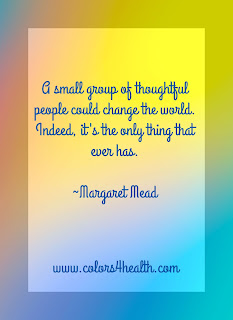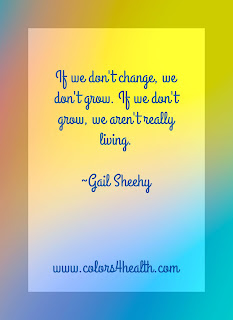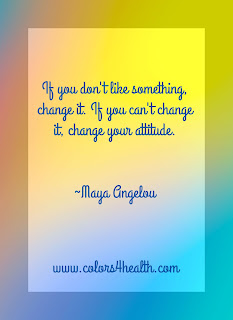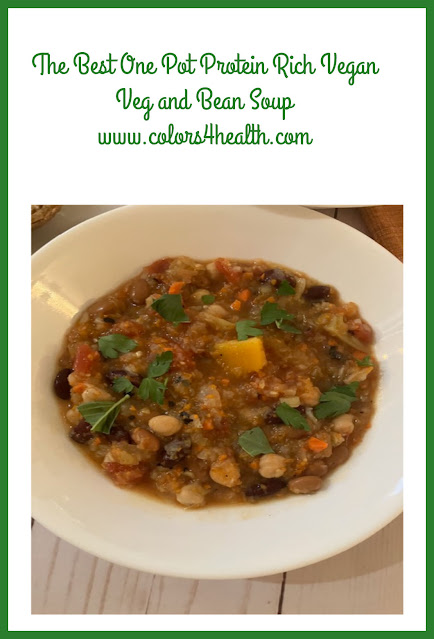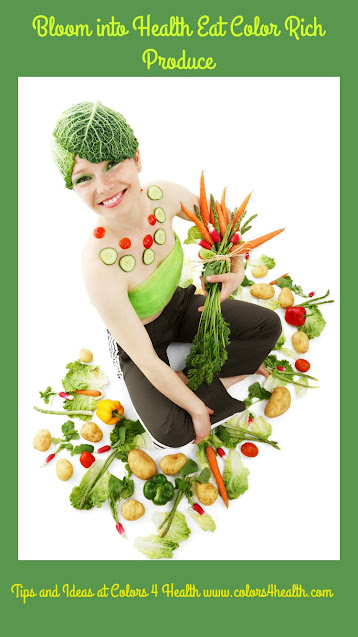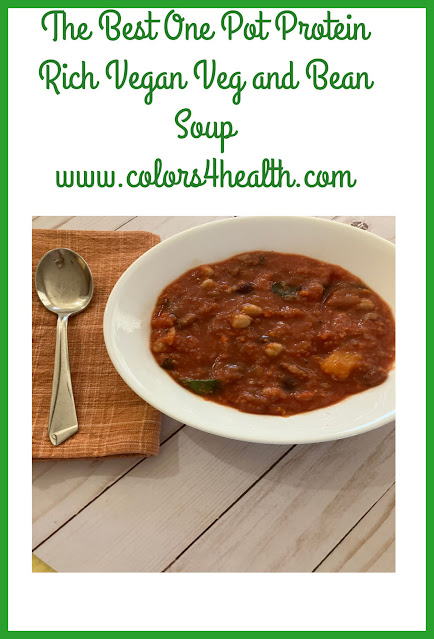There’s nothing more comforting or inviting than a bowl of vegetable bean
soup on a chilly night, during any season of the year.
This recipe is simple, uses pantry stables like canned beans and canned tomatoes, and includes a goodly amount of seasonal veggies to reap health benefits and good taste rewards.
It's a tried and true vegan recipe that I come back to again and again, because it's filling (Whole Food Plant-based/WFPB), simple, protein rich, and simmers on the stove for an hour, while I do other things.
I select veggies according to what's freshest, in-season, on sale, or growing in my garden.
Look Below for Veggies by Season:
FALL: I add potatoes, parsnip, turnip, red cabbage, peeled broccoli stalks, shallots, and butternut squash to my fall soups as these veggies are in-season and at their peak for high nutrition and flavor.
WINTER: My additional veggies may include Brussels sprouts, parsnip, turnip, peeled broccoli stalks, collard greens, celeriac, Chinese cabbage, sweet potato, butternut squash, and Delicata squash. I use this variety of squash, because it is less work than other squash, as its skin is edible and doesn't have to be peeled off.
SPRING: In spring I choose several veggies including some form of peas like sweet peas, snap peas, or snow peas. I also like to add asparagus, green onions, leeks, mushrooms, chard, and spinach.
SUMMER: In summer I include zucchini and other summer squash like Calabacitas, green beans, red, yellow, or green peppers, leeks, corn, mushrooms, and fresh tomatoes.
The soup may taste slightly different each time I make it, but I laugh for joy and say "this is the best."
The Best One Pot Protein Rich Vegan Veg and Bean Soup
Delicious, easy, comforting, and nutritious. This versatile soup is so colorful and scrumptious you'll be making this recipe fall, winter, spring, and summer.
Ingredients:
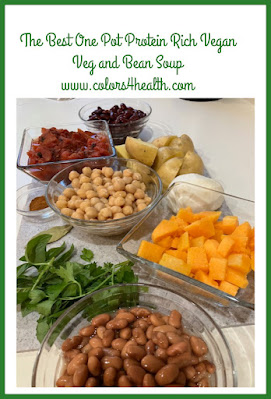 |
| pinto beans, basil and parsley, butternut squash, turnip, chickpeas, Yukon gold potatoes, fire roasted diced tomatoes, dark red kidney beans |
1 medium yellow onion peeled
2-3 carrots, scraped but not peeled
2-3 medium sized thin skin potatoes like Yukon gold(scrub and leave skin on)
3- 15 oz. cans any kind of beans-rinsed and drained
1 large can (28 oz.) fire roasted diced tomatoes
approximately 4 cups of mixed vegetables from those listed by season
salt and fresh ground pepper to taste
1 dried bay leaf
1 teaspoon smoked paprika
1 /2 cup parsley (or dried)
1/2 cup fresh basil (or dried)
4 cups water or one box low sodium veg broth
TIP: Feel free to add or leave out as many fresh veggies as you like. If you'd like to use more than 4 cups of veggies, add extra water or veg broth.
When we eat a variety of produce of various colors, we give our bodies the mix of nutrients it needs for good health.
What to Do:
1. Assemble all ingredients before starting to cook. Rinse the beans. I used pinto beans, dark red kidney beans, and garbanzo/chick- peas, and then put them to the side.
2. Either hand dice or use a food processor to dice carrots, celery, onion, and garlic. Add grated ginger.
3. In a large Dutch oven or large soup pot, sweat the aromatics. this means to cook celery, onions, carrots, garlic, and ginger in a drop of water or oil over low heat for about 10 minutes, until they soften but don't brown.
This cooking technique allows these starter veggies to soften so their rich flavor and aroma can infuse the soup.
4. Then add 4 cups of mixed veggies of your choosing, and 4 cups water or veg broth.
5. Bring the pot of soup to a boil and reduce heat to a simmer. Add all dried seasonings, spices, and herbs except for the can of fire-roasted tomatoes.
Pour in beans, stir, and cover pot to allow it to simmer on stovetop. Cook for approximately one half hour or until veggies are as soft or crunchy as you like.
Note: Beans and legumes are high
in plant-based protein. Garbanzo, pinto, and dark red kidney beans increased the protein count of this soup by 20 grams of protein.
Beans or legumes like lentils add
texture, fiber, protein, taste, and creaminess to the soup, and it's so filling and satisfying this way.
Veggies in this soup contain plant-based protein as well. Following are details about veggies that are excellent sources of plant-based protein.
Celery has .7 grams of protein in each cup, and is an excellent
source of Vitamin K.
Carrots have 1 gram of protein in each cup. They are an excellent
source of potassium, antioxidants, and Vitamin A.
Onions A medium size onion has about 1.2 grams of protein, and contains many important vitamins and minerals.
Green peas Green
peas are at the top of the list of the most protein-filled vegetables.
Technically, they’re legumes, but many of us consider them vegetables because
of their bright green color and delicate flavor. You might be surprised by
their protein content. A cup of green peas contains about 8 grams of
protein. Plus, they’re super easy to serve, since you can toss a handful of
peas into almost anything for an extra pop of protein.
Spinach To get the most benefits from this
leafy green, go ahead and cook it. A cup of cooked spinach contains 5.3 grams
of protein. Other benefits include high levels of iron, folic acid, vitamin C,
vitamin K and calcium.
Collard greens A
one-cup serving of this dark leafy green (cooked) contains 5.1 grams of
protein.
Red pepper One cooked red pepper has 1 gram of protein as well as being high in vitamin C, fiber, and antioxidants.
Sweet corn Whether
you buy it at your local farmers market or grocery store, don’t pass up the
sweet corn. A large ear of sweet yellow corn will provide about 4 grams of
protein. Cut it off the cob and add to the soup or use frozen corn kernels.
Lima beans One cup of cooked lima beans has 15
grams of protein. Toss lima beans into the soup to raise the protein content. Lima
beans and butter beans are in season in the late summer, but you can get them
dried and frozen all year.
Asparagus Asparagus is a favorite spring crop in the northern
hemisphere, but is available the whole year, thanks to the freezer section at
the store. A cup of cooked asparagus contains about 2.1 grams of protein.
Broccoli A cup of cooked broccoli contains about 1.9 grams of protein. Broccoli deserves its
reputation as a “superfood” because it’s high in fiber, folates, vitamin C,
vitamin K and potassium. Only use the stalks of broccoli in soup, as the florets will get overcooked and taste bitter.
Butternut Squash This golden yellow/orange colored type of winter squash has 1.4 grams of protein in each cup. Butternut squash is low in calories (63 per cup) but high in many nutrients including Vitamin A, Vitamin C, magnesium, and potassium.
Cauliflower provides 1.4 grams of protein per cup, and is also high
in fiber, potassium, and antioxidants.
Brussels sprouts A cup
of cooked Brussels sprouts contains about 2 grams of protein and lots of
vitamin K, calcium, and vitamin C. Put it in soup or try this simple recipe for roasted Brussels sprouts.
Yukon gold potatoes have 3 grams of protein in
each cup, and are a good source of calcium and potassium.
🥣
I add tomatoes a half hour into cooking time. The high acid content of tomatoes slows down the cooking process, but for top nutrition tomatoes need to cook for at least a half an hour.
The powerful carotenoid (antioxidant) present in tomatoes called lycopene, is most potent when cooked thoroughly.
If I'm using fresh herbs I add them about ten minutes before I'm ready to turn off stove.
Fresh basil and parsley don't need to be cooked long to release their flavor and still retain bright green color.
6. Taste soup and correct seasoning. I love chunky soup, but if you enjoy soup that has a smooth consistency, blend a few times with an immersion blender to break down the
starchy vegetables.
If you don't
have an immersion blender you can scoop out a cup or two of soup and pulse it in the food processor. Then add it back into the pot.
Another way to do it, is to use a potato masher
right in the pot, and stir well.
7.Ladle soup into bowls and serve piping hot.
Serve with crackers or dunk in crusty whole grain bread. To make this one pot meal heartier, mix in a couple of cups of cooked whole grains or seeds like rice, quinoa, millet, or pasta.
I like to batch cook, and am happy to say this recipe will serve four to five heaping portions (I save some in the refrigerator or freezer) or invite company for dinner.
This homemade protein rich vegan veg and bean soup recipe is so versatile. It can be made year
round.
Just use in-season veggies and keep the base the same: garlic, ginger, onions,
carrots, and celery.
Before you go, please comment below.
Just remember to put no links in your comment, as I won't be able to publish it that way. Thanks for understanding.
Do you make homemade soups and what's your favorite kind?
What kind of additional veggies do you think you'd like to use?
If you make it, please take a picture and send an email to nancyandreswriter@gmail.com.
I'd love to see your handwork, and may upload your picture to this post with a link back to your blog.
By the way, Did you enjoy reading this post? Visit me on Facebook and Pinterest for
more.
This post has been shared at senior-salon-pit-stop #340
This post has been shared at What’s for Dinner? Sunday link up 440



